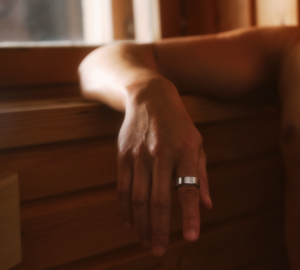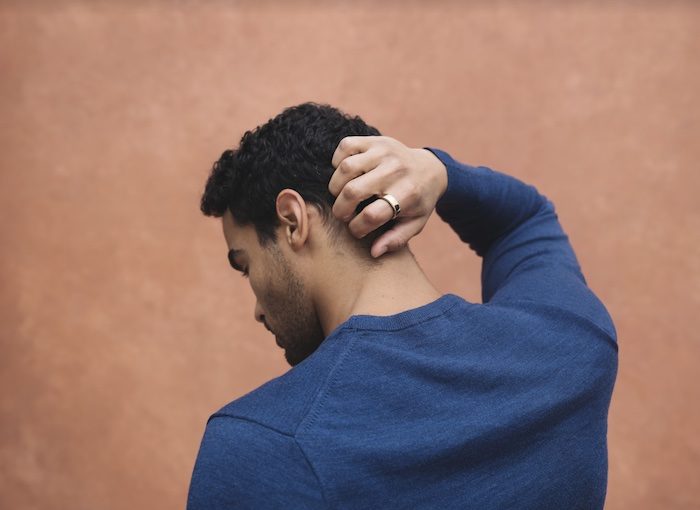- Nearly three in four U.S. adults aren’t getting enough sleep.
- Common reasons behind the lack of sleep when tired are linked to potential sleep disruptors, including hormones, activity levels, and health conditions.
- Tracking your sleep with Oura gives you access to features that can help you optimize your sleep hygiene and fall asleep faster.
Getting restful, energizing sleep has become increasingly difficult in today’s busy world. In fact, new research suggests that nearly three in four U.S. adults do not get enough restorative sleep.
Then there’s also the issue of sleep quality, or the extent to which sleep relaxes you and prepares you for the next morning. You may find yourself trudging through your daily tasks only to find yourself in bed, wide awake, and staring at the ceiling come night time.
If feeling “tired but wired” is something you experience often, we’re here to help! Below, we’ll look at some of the top reasons why you may be tired yet unable to sleep, as well as some possible solutions to improve the quality of your sleep.
| Member Tip: In the Oura App, your Sleep Score provides personalized insights into your unique sleep patterns and guidance on improving sleep quality. By the way: 86% of Oura Members report an improvement in their sleep quality in the first 30 days! Learn more here. |
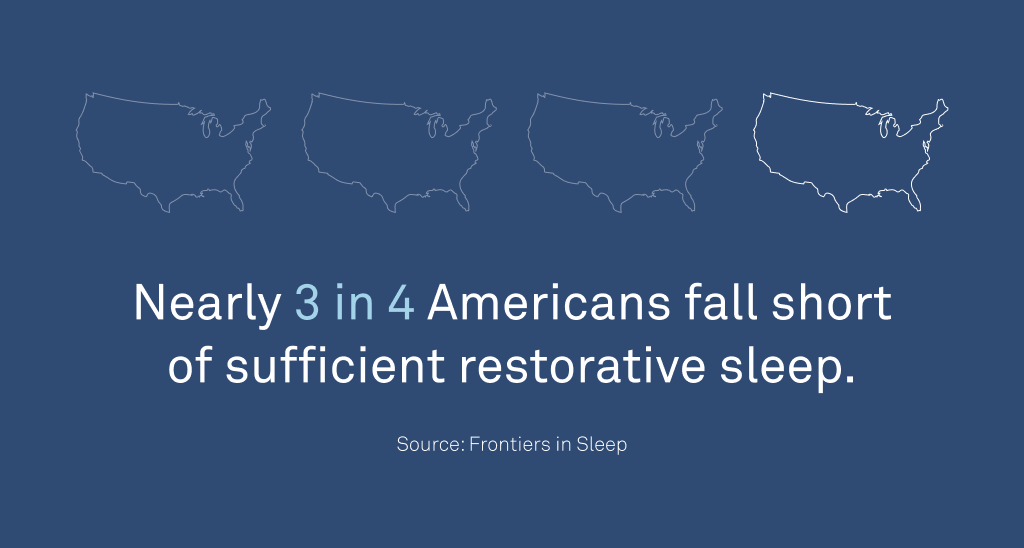
The Two-Process Model of Sleep
In the 1980s, Alexander Borbély — a Hungarian-Swiss pharmacologist renowned for his sleep research — established the two-process model of sleep regulation. This model suggests two major processes that account for the structure and quality of sleep: sleep-wake homeostasis (more commonly understood as sleep debt) and the circadian rhythm.
Sleep-Wake Homeostasis
Sleep-wake homeostasis refers to the balance your body maintains between the amount of sleep you require and the amount of sleep you get. The closer your acquired sleep is to your required sleep, the better you will likely feel.
Put simply, sleep-wake homeostasis is a kind of internal regulator that causes pressure to fall asleep — this pressure accumulates throughout the day until it peaks at bedtime and sends you to sleep. The pressure resets to zero the following morning after you’ve gotten enough quality sleep.
READ MORE: Sleep Debt: Is It Possible to Catch Up on Lost Sleep?
The Circadian Rhythm
This refers to your body’s perception of when to wake up and when to sleep, i.e., your internal clock. In other words, the circadian rhythm dictates your daily sleep patterns and is responsible for both the amount and quality of your sleep.
Over a 24-hour period, the circadian rhythm regulates your body’s core body temperature, hormone production, eating patterns, and brain wave activity, all of which affect your sleep patterns.
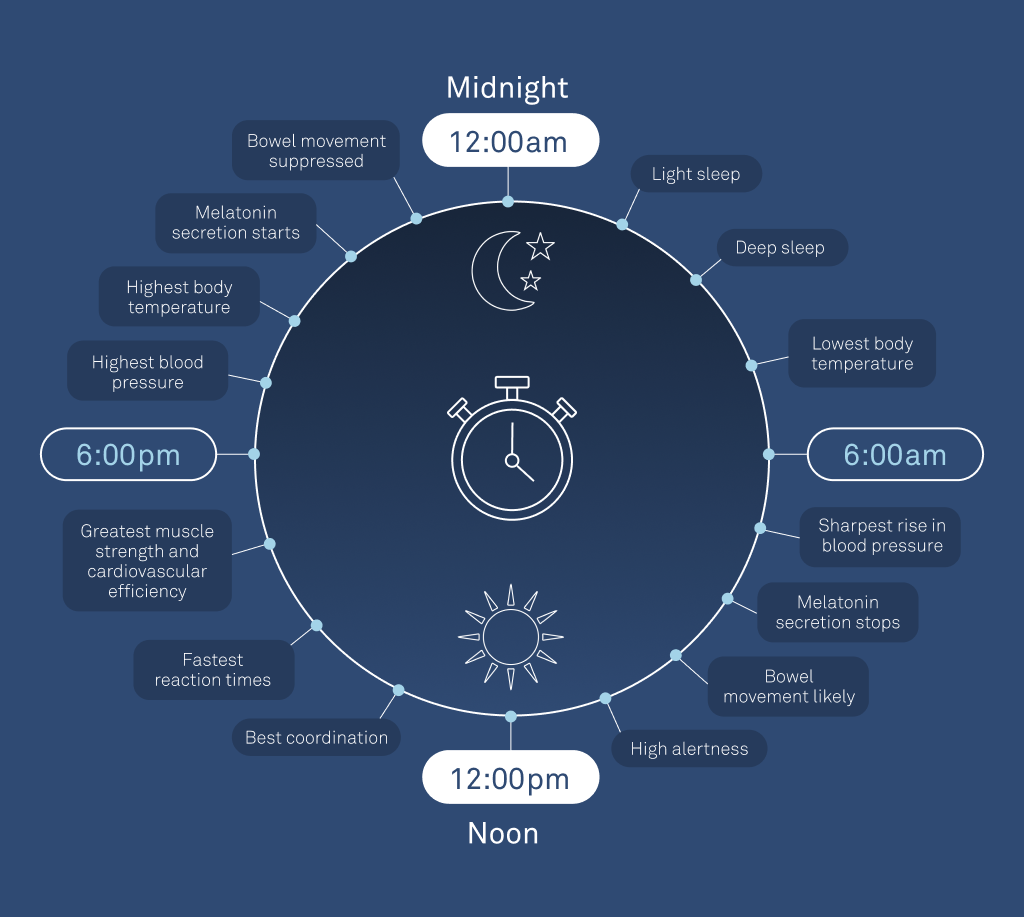
RELATED: Circadian Rhythms and Your Bedtime
Sleep-wake homeostasis and the circadian rhythm interact to create a balanced sleep-wake cycle. As such, getting a good night’s sleep depends on these two processes working seamlessly together. If they misalign, they cause all sorts of disruptions in your sleep, including the inability to sleep even when you’re tired.
So, what could cause these two processes to misalign?
Why Do You Feel Tired but Are Unable to Sleep?
The following are some of the top reasons why you may feel tired and worn out but are unable to nod off in bed:
1. Less-Than-Stellar Sleep Hygiene
Sleep hygiene refers to the habits, behaviors, routines, and environment around you at bedtime. Poor sleep hygiene is one of the major factors that negatively impact the quality of your sleep and make it difficult to fall asleep, even when you’re tired.
LEARN MORE: 5 Ways to Upgrade Your Sleep Hygiene
Here are three ways your sleep hygiene could be disrupting your sleep:
You consume stimulants before bed.
A late cup of tea or coffee before bed may seem like a good idea, but it may not be the best choice for a wind-down drink. Here’s the thing: tea contains caffeine, a stimulant that will help keep you alert and awake. Unfortunately, caffeine has a half-life of five hours, which means it can take up to 10 hours to flush out all the caffeine in your body.
READ MORE: The Impact of Caffeine on Sleep
Consuming a glass of water, decaf tea, or some cocoa before bed might be a better option than caffeine.
You nap for too long during the day.
There’s nothing inherently wrong with napping; short naps of 15-20 minutes taken no more than twice a day are beneficial. That being said, taking too many naps for too long can be harmful to your health, causing a variety of issues such as nighttime sleep problems and general grogginess.
LEARN MORE: How Long Should You Nap?
You stress yourself out before bed.
This one is fairly simple; if you subject your brain to stressful situations right before bed — for example, watching a graphic thriller or having a heated argument with your partner — you’ll release a stress-control hormone called cortisol, impairing your ability to fall asleep at night.
To avoid disrupting your sleeping pattern, make sure that you’re relaxed before bed.
READ MORE: 5 Simple Breathing Techniques for a Good Night’s Sleep
For instance, this can imply deferring discussions of contentious issues with your partner to a time other than right before bedtime, preferably in the morning. And if you’re going to watch something before going to bed, choose something relaxing and comforting, ideally with the support of a blue-light blocking method. That true-crime documentary can be saved for another day!
You eat heavy meals before bed.
When you consume a large meal close to bedtime, several things happen:
- Your body needs to work harder to digest the food. This can lead to discomfort, indigestion, and even acid reflux, making falling and staying asleep difficult.
- There’s a temporary increase in your blood sugar and heart rate, and a potential slight drop in blood pressure. All these changes can disrupt your sleep.
| Member Tip: In the Oura App, you can use Tags to see how a late meal impacts your sleep quality. The connections you discover can then be visualized as Trends over time, helping you improve your sleep habits. |
If you must eat before bed, opt for a snack that will help you sleep better.
LEARN MORE: How Late-Night Eating Can Impact Your Sleep
You have too much screentime before bed.
The blue light emitted from screens can suppress the production of melatonin, a hormone that helps to regulate sleep-wake cycles. Additionally, the content on screens can be stimulating and make it difficult to wind down before bed.
To improve your sleep hygiene, avoid using screens in the hour before bed. Instead, try reading a book, taking a bath, listening to calming music, or practicing meditation.
| Member Tip: Oura members can access guided meditations and sleep sounds on the Oura App in the Explore content. At the end of a session, you get some biofeedback to see your body’s response to the session. |
2. Disruptions in Your Circadian Rhythm
Disturbing your internal clock is a tried-and-true way to impact your ability to fall asleep at the right time. Some of the factors that will disrupt your circadian rhythm include:
Jet lag — real, virtual, or social
When you change time zones, your body doesn’t immediately adjust. This could mean spending days, and sometimes weeks, adjusting to the sunrise, sunset, and daylight length in your current location. During this time, your sleep cycle will likely be disrupted, making it difficult to sleep – even when you’re exhausted.
It’s important to note that jet lag is not only caused by physical movement. That early-morning virtual conference you signed up for? The late-night interview you agreed to so no one else is inconvenienced? Perhaps you are someone who stays up late on Fridays and Saturdays to socialize, resulting in social jet lag.
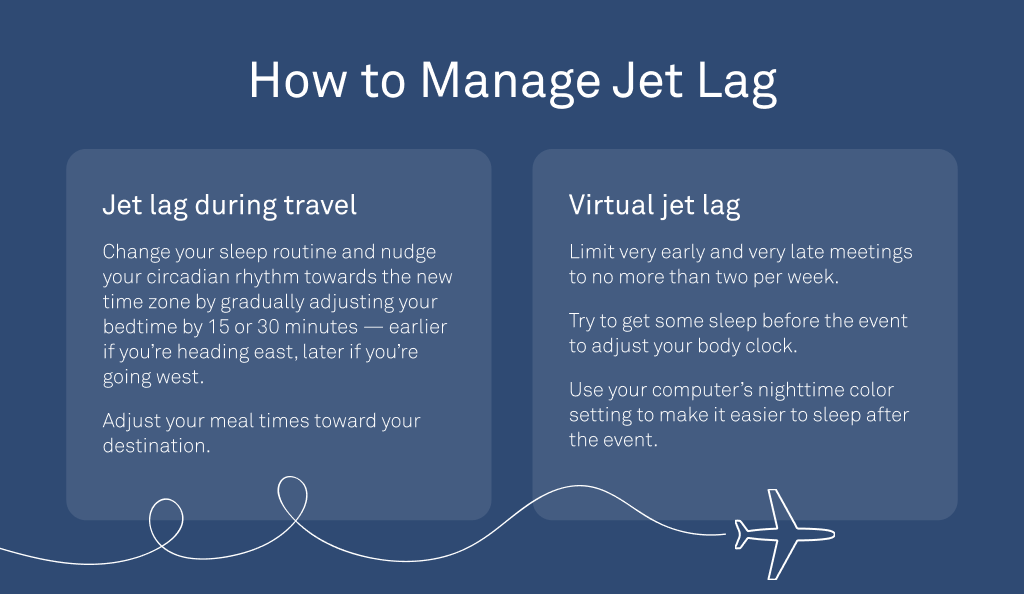
All those events add up, disrupting your body’s understanding of day and night, making it more difficult to fall asleep.
If you’re physically traveling across time zones, consider preparing in advance by familiarizing yourself with strategies for managing jet lag. For example, you can nudge your clocks back if you’re traveling east, and forward if you’re traveling west. You can also adjust your sleeping schedules so that the shift doesn’t catch you off guard.
LEARN MORE: 7 Science-Backed Strategies to Manage Jet Lag
In the event of virtual time zone shifts, try to limit early-morning or extremely late-night calls to two per week at most. Consider these calls to be roughly equivalent to physically changing time zones; there is no difference as far as your circadian rhythm is concerned.
Night shifts
Night shifts are a more short-term version of jet lag in that you’re not changing your location, but temporarily disrupting how your body works and sleeps. If you work frequent irregular night shifts, your body will be perpetually confused and will not know when to release the appropriate hormones to wake you up and wind you down, respectively.
While working night shifts regularly will leave you vulnerable in the long run, there are steps you can take to mitigate the effects. You could take a 15-20-minute nap before leaving for your shift, for example. You could also eat small amounts of protein and vitamin-rich foods throughout your shift rather than drinking coffee, which will only deplete your energy later in the day.
LEARN MORE: 9 Science-Backed Herbs and Supplements for Better Sleep
3. Medical Conditions
Medical conditions and sleep disorders like insomnia, narcolepsy, and sleep apnea can disrupt sleep patterns, making it harder to go to bed at the time that’s best for you. Insomnia, in particular, is widespread worldwide, affecting 30% of all adults. Additionally, pain from injuries can make it challenging to find a comfortable sleeping position, resulting in difficulty falling asleep and frequent awakenings.
Mental health conditions, such as anxiety, chronic stress, depression, and Seasonal Affective Disorder (SAD) can also be responsible for keeping you up at night. For example, people with SAD tend to have depressive symptoms, which can interfere with their sleep.
“During the winter months, while most places in the world have limited exposure to sunlight, there is a greater risk for SAD. Natural sunlight is the most powerful synchronizer of our circadian rhythm,” explains Rebecca Robbins, Ph.D., sleep researcher and Oura advisor. “Without exposure to natural sunlight, our brain is limited in its ability to understand when it should be tired and when it should be alert.” This puts us at risk for sleep disruptions, such as difficulties falling asleep and maintaining sleep.
If you suspect you might have a medical condition that prevents you from sleeping even when you’re tired, the best decision is to see a professional and get a diagnosis. You can also take some supplementary measures to reduce the impacts of the conditions, including optimizing your sleep environment and using tools that can help you minimize or treat the symptoms of a given condition.
“There is a well-documented bi-directional relationship between sleep difficulties and depressive symptoms, such as SAD symptoms. In other words, sleep difficulties or a poor sleep schedule (e.g., maintaining an inconsistent sleep schedule) and depressive symptoms mutually impact one another,” adds Dr. Robbins. “Maintaining a consistent sleep schedule and taking advantage of natural, blue light in your environment when the sun is up may buffer against risk for SAD.”
Moreover, if you’re an Oura member, you can monitor your heart rate variability (HRV) to check if mental health conditions such as anxiety are keeping you awake.
“When we are relaxed, our HRV tends to be higher, and when we are stressed or anxious, our HRV tends to be lower, therefore, HRV could be a sign of feelings of anxiety,” notes Dr. Robbins. “Anxious feelings could be one thing that keeps you up at night. When we are faced with stress and not consciously engaging in adaptive coping strategies, such as breathwork or other relaxation techniques, we can face an elevated heart rate and breath rate.”
READ MORE: Oura Helps Me Improve My Sleep & Better Manage My Mental Health
4. Not Enough Exercise During the Day
A lack of activity can leave you feeling lethargic and exhausted even if your body isn’t physically tired enough to sleep well. That’s because physical movement promotes and maintains both physical and mental health, allowing for better quality sleep.
To ensure that a lack of exercise doesn’t prevent you from getting adequate shuteye, aim to have at least 150 minutes of moderate aerobic activity or 75 minutes of vigorous aerobic exercise every week.
5. Disrupted Hormone Levels
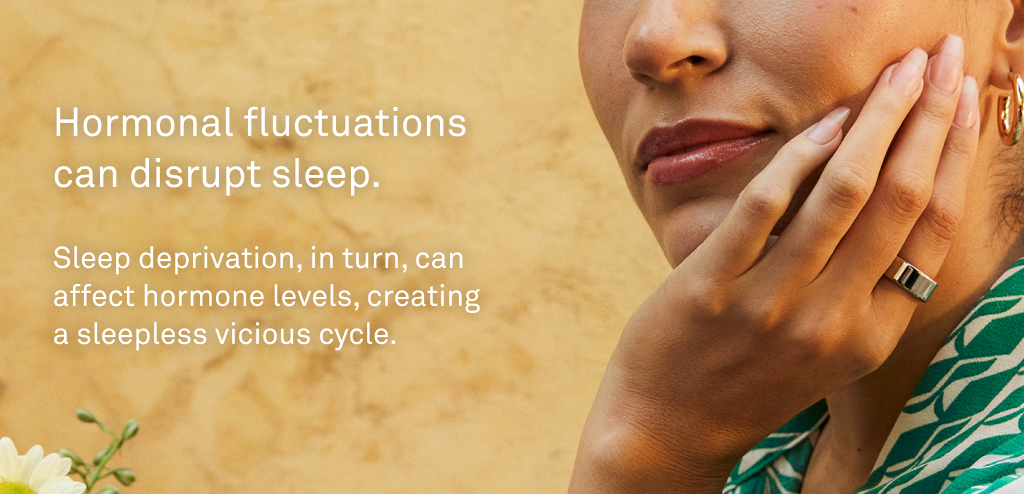
For example, stressors and electronic devices that suppress your body’s melatonin production can lead to high cortisol levels at night when the levels should be low. This will disrupt your sleeping patterns and keep you awake. On the other hand, cortisol levels that are too low can cause weakness, fatigue, and low blood pressure.
Low testosterone levels in men can cause tiredness, while elevated estrogen and progesterone levels in women can cause fatigue and mood swings. All of this will most likely keep you awake at night.
If you are struggling with sleepless nights even when you’re tired, consider seeing your doctor or sleep specialist for a test to help determine if your hormones are in check, and to help determine a treatment plan if they are out of balance.
Optimizing Your Sleep with Oura
Implementing solutions to stabilize your circadian rhythm and practicing good sleep hygiene can help you improve sleep latency and maximize the amount of sleep you get.
RELATED: 8 Ways to Get More Deep Sleep, According to Oura Members
About the Oura Expert
Rebecca Robbins, Ph.D., is an Instructor in Medicine at Harvard Medical School and an Associate Scientist at the Brigham and Women’s Hospital. Her research uses marketing and novel communication tools and technologies (i.e. smartphones and other mobile devices) to design persuasive behavior change interventions to improve sleep and circadian health. In 2011, Dr. Robbins co-authored Sleep for Success! with Dr. James B. Maas. Dr. Robbins’ research has appeared in the New York Times, the Financial Times, and Readers’ Digest, and she has appeared on The Today Show, Live! With Kelly Ripa and Ryan Seacrest, Fox Business News, ABC Nightline, CNBC, and CBS This Morning.


